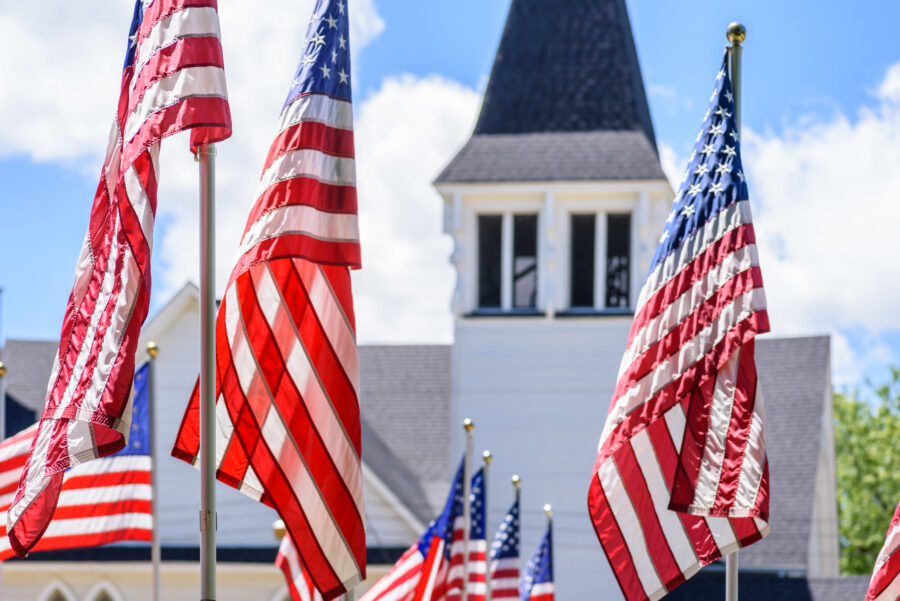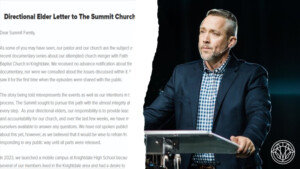The Case For Christian Citizenship

Christian: An term indicating a person or entity’s conformity in word and deed to the tenets of Christianity as defined by the Bible.
Nationalism: Loyalty, commitment, and love for one’s neighbors as defined by common geography, culture, and legal status.
Christian Nationalism: The practice of nationalism as properly oriented by Christian beliefs and practices.
There, I’ve added my definition to the laundry list. It’s short and simple, and (like other broad ideas) relies on proper, functional definitions of the embedded terms Christian, nationalism, neighbor, and love.
Setting aside for the moment the strategic value of either embracing or abandoning “Christian Nationalism” as an identifier, the apparent disagreements over its definitional and theological presuppositions have made Christian Nationalism quite the wedge issue. While I hope to find common ground for both sides of the debate, it is just as likely I’ll make both sides mad at me. Let’s get started…
Note: This is a long read. If you’d prefer to skip to my summary points, feel free to scroll all the way down.
The Latest Kerfuffle
There appears to be a fracturing in Reformed Christianity’s tenuous anti-woke alliance. Recently, social media posts from Josh Buice and Scott Aniol of G3 Ministries (representing a conservative and decidedly Baptistic coalition) have launched warning shots across the bow of the SS Christian Nationalist (and its lovable rogue’s gallery of culture warriors), reminding all ships navigating the choppy waters of doctrinal conservatism that the Baptists refuse to fly the Christian Prince flag. And of course, the deinstitutionalized but doctrinally-interested pew-sitters that read Protestia wonder what to make of the tempest that, while often raging in the Ph.D. stratosphere, touches down long enough to get us all yelling at each other, boarding up our digital windows, and reshuffling our personal “naughty or nice” lists of online Christian influencers.
Recently this tempest hit Category 5 following a tweet by The Case For Christian Nationalism author and political philosopher Stephen Wolfe. Wolfe stated (with requisite Rockwell “Freedom of Speech” image) that “White evangelicals are the lone bulwark against moral insanity in America,” causing conservative voices to respond – some with denouncement, others with clarification or defense, and almost all with varying degrees of vacillation.
Of core concern to this debate is how Christians should best address the apparent moral freefall of Western civilization, as every corner of the internet (that “place” many of us now see as “reality”) is rife with increasingly offensive and outlandish displays of godless behavior. In this new illusory society, we are given a front-row seat to endless, mindless violence, we see horribly lonely “influencers” trading what is left of reality for another hit of attention, and we watch our epistemological common ground turning into digital quicksand. All the while, our subconsciouses suspect a dystopian truth our minds can’t bring themselves to admit: none of this is real and we are all alone.
Is there more violent crime in the country than in years past? Not really, but it doesn’t matter because there is more apparent violence. Is there more sexual deviancy? We suspect yes, but the internet-driven vicious cycle of attention that turns real-world whores into attention whores (and visa versa) makes it hard to tell if Drag Queen Story Hour™ may perhaps simply be the culturally deviant tail wagging the woke dog.
Ours is a society now entirely unhitched from the responsible, moral, and Imago Dei-based principled individualism of the recent past, having replaced it with a morally disconnected, psychologized, and profoundly self-worshiping counterfeit. What began with the industrial age’s disconnection of people from the traditional bounds of physical existence (through transportation and common media) has now become the information age’s disconnection of self from the unified human nature of body, mind, and spirit. Many of us now live full-time as digital residents – our physical bodies existing in the old world with our self residing in the digital realm. This dangerous place reinforces the first and most pernicious lie ever told – that we are like God. And as gods of our digital kingdoms, we exercise dictatorial authority. We enlist big tech companies to function as our digital Praetorian Guard, ensuring we see only what we want. Anything we don’t care for ceases to exist.
The Theological Battleground
In the same fashion, many Christians have cut themselves loose from the bounds of the local church, preferring instead a digital version where they act as their own personal ecclesiastical authority. Traditional brick-and-mortar churches, many of which have now become mere retailers of spiritual products, stand laughably impotent in the face of the moral anarchy that has ridden into their communities on the back of godless self-empowerment and a cowardly pietism that regulates spiritual matters to a place isolated from the physical and public parts of a person’s existence. Pastors grandstand with appeals to the “universal church,” as if this reality can be exercised in any practical sense, giving themselves a “let go and let God” excuse for self-serving neutrality on hot-button cultural issues.
In this new digitized life, the historical connection of knowledge between laity, clergy, and the academy has been replaced with a free-for-all. Academics scramble to maintain their ivory tower bona fides, PR-focused pastors conduct their ministries beneath the shadow of their online personas, and pew-sitters relish their equal access to the conversation even as many demonstrate how ill-equipped they are to participate. Institutional barriers have been obliterated, for better and worse. “Everyone’s a Theologian,” said R.C. Sproul, but now everyone is a public theologian in a conversation where the rules of discourse, credibility, and influence are up for grabs. Institutionalists calculate how much compromise is necessary to remain relevant, vision-casting marketers conduct focus groups to figure out the next method for drawing new crowds (while keeping the current one sufficiently sedated), and invested pew-sitters wonder why public Christianity seemingly has no answer to the chaos.
It is within this chaos that the battle for the soul of biblically serious, orthodox Christianity is being waged. While there are nearly as many unique doctrinal and practical outworkings of the Christian faith as there are Christians, this battle is focused on the proper response of believers to the rapid advancement of godless ideologies, behavior, and social decay in a country not long ago uncontroversially called a Christian nation.
The tribal borders of the debate are not perfectly defined and there is an understandable crossover among various camps, yet there appear to be two distinct cohorts forming. Neutrality is disappearing as pressure increases on everyone to take a side or risk having a side assigned to them.
Christian Nationalism
On one side is a newly-emerging strain of conservative thought that has embraced the label Christian Nationalism, formed by a relatively young, loose coalition of Presbyterians, Reformed Baptists, and evangelical culture warriors. This coalition focuses on reasserting the Christian call to unashamedly practice public faith. These brothers and sisters are quite willing to battle for “Christian” institutions, even as they generally acknowledge that “Christian” describes conformity to Christian practice rather than all participants being professing, regenerate Christians. Consisting largely of postmillennial Calvinists, the coalition sees the adoption of classical liberalism in society and church as opening the door to all manner of godless depravity, and that nations (America, in our case) should seek to promote Christian virtue and values in public life. They reject the idea that a “neutral” (secular) civil government can exist.
Liberty
On the other side of the debate are those who might be termed individualists, or those who believe in a strong distinction between churches and civil governing authorities, and for whom individual liberty practiced in civil life is a non-negotiable, essential component of a just society. This coalition is comprised of non-postmillennialists, dispensationalists, classical liberals, civil libertarians, and both traditional and Calvinistic Baptists, who are concerned that a deemphasis on individual liberty in the exercise of civil government will result in authoritarianism. They tend to believe that not only does the “Christianization” of worldly institutions have no biblical warrant (and likely no practical possibility), the term “Christian Nationalism” is definitionally unclear, has been effectively marginalized by progressive “Christians,” and has been strategically spun by the godless culture to be analogous to “white nationalism.”
Definitions
The disagreements over underlying theology are real, yet the grounds for the visible divide are likely far more superficial than they seem. Both sides routinely mock one another, and while mockery is obviously not a problem to Protestia in principle, the barbs traded by these camps (sometimes with disfellowshipping absolution) require context to be understood as more than just meme-worthy theological mud-slinging.
True common ground begins with common definitions. And common definitions should be functional not only among the learned and initiated but among casual observers in and out of the church. The current battle is as much about definitions as anything, and whether or not the term Christian Nationalism ends up being strategically useful, it must be grounded by its logical and functional definition.
“Christian”
Arguments for the impossibility of a Christian nation often begin with the disqualifying technicality, “A Christian is a person saved by grace through faith in Jesus Christ as Lord and Savior, regenerated by the Holy Spirit! Therefore a nation can’t be Christian unless every person is a true believer!”
Yes, we know an institution cannot be regenerated. Yet somehow the term Christian has been utilized to describe businesses, schools, households, and even churches almost as long as the word had been around. Not only can no institution be called “Christian” under the standard of 100% regeneration, no actual Christian bears the label with falsifiable certainty. The regeneration standard eliminates the use of “Christian” for anything other than as a “more likely than not” spiritual abstract.
Instead, the Christian identifier can and should be used as it has been throughout history – to describe who or what bears specifically Christian characteristics as distinct from non-Christian. For instance, a church should be labeled “Christian” when it proclaims, acts, and ministers in accordance with true Christian doctrine. When compared with non-Christian religious institutions, a Christian church is distinct – based on defined attributes. A school or business is called “Christian” if it operates according to principles that are morally and ethically Christian – not because every person involved has proven themselves to be an actual Christian. This is no less true when applied to a nation, and a nation is called “Christian” when its laws, jurisprudence, and culture bear a distinctly Christian signature.
“Nationalism”
Despite the word being used as a pejorative in some contexts (“White nationalism,” for example), the word nationalism simply denotes a love for, loyalty to, and commitment to the good of one’s nation as distinct from other nations. Properly oriented nationalism – love of nation – requires two primary components: identification of one’s nation, and identification of what is good. Nations as distinct peoples, cultures, and social norms are foundational to human civilization, and love for one’s nation is a direct outpouring of the second great commandment, to love our neighbors as ourselves. Rather than an emotional expression, this love is practical, and begins with those closest to us – family, church, community, and nation. While we may send missionaries to far-off nations to preach the Gospel, proper practice of ordinary, neighborly love necessitates nationalism.
This love is defined by God’s Word – both by his law and by the equal value of all men created in his image (Matthew 22:39). After all, true love of one’s nation must first be true love.
The command that all Christians should love their neighbors as themselves forms the basis for civil government that is identifiably Christian – informed by both the equality of mankind before God and the distinct sphere of jurisdiction granted to civil authorities versus churches, families, and individuals. As God’s justice is applied to the individual soul, so civil justice is only proper when applied likewise. This fundamental truth which finds expression in individual rights stands opposed to Marxism, critical theory, and any other godless belief structure that devalues mankind by collectivizing justice.
Biblical Common Ground
As the descriptor “Christian” is limited to what can be observed, nationalism is the logical result of loving our neighbors, and love is proper only when conformed to the Word of God, we return ourselves to the basic question Francis Schaeffer rightly asked nearly 50 years ago: How Should We Then Live?
In the Sermon on the Mount, Jesus assigned numerical generalities to the wide and narrow gate (Matt. 7:13-14). As He taught that many will enter the wide gate and be destroyed while few will take the hard path through the narrow gate that leads to life, we can safely assume that Christians will belong to nations where most people are not truly regenerated. This may be seen in their overt rejection of Christ in word and deed, or in the many who claim Christ but do not truly have Him (Matt. 7:21), but it is clear that the majority of people we call countrymen are not believers. Righteous law – made for the ungodly and sinful rather than the righteous (1 Tim. 1:8-10) – can and should restrain (and benefit) believers and unbelievers alike.
Scripture defines a distinct jurisdiction and role for governing authorities (Romans 13:1-7, 1 Peter 2:13-14), the instructions to submit to governing authorities are applied to individuals, and it is the individual that will be held responsible for compliance. This compliance is in the area of civil conduct and citizenry, not in matters scripture assigns to other jurisdictions such as the church (Heb. 13:17, Eph. 5:21), home (1 Peter 3:1-6, Eph. 5:22-24), workplace (Eph. 6:5-8), and of course our primary submission to God Himself (James 4:7, Acts 5:29).
Civil government should treat the regenerated Christian, the unregenerated “Christian,” the Muslim, Jew, or atheist the same so long as they are doing right and not wrong in their civic participation. Yet the government, which is to be a judicial mediator of individual interests outside of the church, has an obligation to orient its moral standards to those that align with the law of God as summarized by the “love of neighbor” standard. The role of a civil magistrate in a “Christian” nation is to “bear the sword” against interpersonal sins of a material (rather than spiritual) nature – murder (or the threat thereof), stealing, adultery, false witness, and the covetousness that leads to all of them.
The Reformers rightly understood that the Bible prescribes no mediator between the believer and God (1 Tim. 2:5). Behavior toward others is subject to our primary submission to God Himself, and we have a Christian duty to control ourselves as our first governing responsibility (Gal. 5:23). This necessitates both individual liberty and individual responsibility, the latter is what Western civilization has abandoned in large part. Christians have a duty to take responsibility for themselves, in order that we might use our liberty to serve God. Our liberty serves God when we use it to promote (with word and deed) the good of our family, church, community, and nation as defined by his Word.
Self-described Christian Nationalists and those who supposedly oppose them are called to do the same thing. We don’t make the same mistake the Israelites made (1 Samuel 8:5), asking for a “Christian prince” to blur the lines between fallen, worldly civilization and our holy nation (1 Peter 2:9), especially in a country where our forefathers wisely placed the lower authority of civil government in our hands. We don’t seek to erase the jurisdictional lines God defined. Nor do we retreat to a position where “cultural Christianity” cannot bring the general equity benefits of God’s law and Christian heritage to public institutions. We don’t seek to hide God’s truth or Christian identity under a bushel under the excuse that we are now merely sojourners. Rather, we unapologetically serve as Christian soldiers, who out of world and self-denying obedience take every opportunity to promote God’s truth. As parents, churchmen, self-governing citizens, and those who have been given the gift of free expression, we shout from the rooftops the Gospel and the full counsel of God’s truth, govern where we’re given the opportunity, live our lives in accordance with our faith, and prepare to suffer for the cause of Christ. We strive to properly discern reality in light of the information age’s distortion of reality and our personal role in altering it. We trust that God truly is working all things for our good because we are His.
Points of Summary
- The plain meaning of “Christian Nationalism” denotes belief and practice that is plainly biblical. This doesn’t mean the term is helpful considering how many versions currently exist that bear untenable presuppositions.
- Christian Nationalism cannot and should not be rejected based on an unfalsifiable and illogical use of the term “Christian.”
- Scripture defines the jurisdiction, scope, and responsibility of government as distinct from other God-ordained authorities (Romans 13:1-7, 1 Peter 2:13-14).
- Godly justice is applied at the level of the individual (individualism), and civil government should do likewise within its jurisdiction (generally, second-table issues).
- Civil government cannot and should not be in the business of judging convictions, beliefs, or religious practices that have no direct relationship to second-table laws, but rather should act to righteously restrain and punish sin committed against its citizens (Rom. 13:4).
- The observable decline of public morality in Western civilization involves the loss of individual moral responsibility to God in the face of material wealth and cultural stagnation, a power-hungry civil magistrate overstepping its biblical mandate to fill the void between individuals and God, and an information age that has further amplified and incentivized the sinful and selfish tendencies of mankind.
- Christian Nationalism unhitched from the moral strictures of individualism is doomed to – at best – marginalization or irrelevance. At worst, it will return us to an age where our public practice is criminalized because someone in power believes differently.
- Christian Citizenship combines the proper motivations and morals of Christian Nationalism with the biblically and naturally evident morality of individualism. Both spiritual and civil justice are applied to the individual, who obeys God by properly submitting to all ordained authority and seeking to self-sacrificially promote godliness in word and deed. He is held responsible for his civic behavior by the magistrate. He is held responsible for his spiritual response to God by God alone.
Addendum: What About Drag Queen Story Hour?
Drag Queen Story Hour™ (DQSH) seems like it has become a plumbline standard for the effectiveness of Christian engagement with the surrounding culture. Depraved expression like DQSH has historically been met with laws against public indecency (perfectly acceptable as instituted by self-governors), but in the absence of such laws, DQSH should be met by vocal opposition to the point that parents exposing their children to such wickedness would be widely shamed. This doesn’t seem to happen in large part because information technology has given rise to separate and self-reinforced subcultures of reality that are disconnected from the pressures of social decency. Parents who commit such abuse against their own children can now find fellow monsters online, feign wide acceptance (to themselves and unwitting observers), and effectively isolate themselves from the still overwhelming opposition to what they are doing. Government institutions (assuming they aren’t activists for deviancy themselves) are unable to weigh the relative preferences of a likely overwhelming public opposition versus a vocal and internet-inflated vocal minority and do not stop it. The answer (now in the works in many places across the country) is to not only stand in vocal opposition to such sin, but to use the gift of self-government to pass laws protecting children from such depravity. Contrary to State Fool David French, this Christian response respects both God’s moral demands and individual liberty, as unconsenting children cannot take responsibility for their exposure to such evil and public identification of sin is a Christian mandate (Ephesians 5:11).







Much of the debate is based on a false dilemma. Those on either side who, perhaps inadvertently, frame Christianity as being opposed to liberty and individualism not only convey an untruth, but also undermine their own arguments. They might as well just shout “there’s slavery in Jesus!”
That’s not true and it is not what the Bible says. We are free in Jesus. God deals with us each on an individual basis. We will be judged as individuals. We have individual access to the Father through Jesus.
Liberty always exists within limits. You could find the most far left, totalitarian, person in this country, and they will be for some measure of liberty (even if it is extremely hypocritical – their own liberty but nobody else’s). And you could find the most far right, ultra-libertarian anarchist in this country, and they would still be for some measure of limits to that liberty. They’ll still be for property rights, against murder, against theft, and so on.
Interestingly enough, if you follow it far enough, the views of each will eventually re-converge. Total communism circles back to total anarchy. And “both” are humanly impossible, specifically because we live in a fallen world, full of imperfect, sinful people. Mankind cannot create Heaven on Earth.
It boils down, then, to a question of what are the limits to our liberty and individualism. Not a question of whether or not liberty is good or bad, but what are the limits to it. What are the standards by which we live. What are our God-given rights and what aren’t. Where do our rights end and someone else’s begin, and vice versa. That’s the question. That’s the core of the issue. And there is no workable compromise. The government, powerful institutions, etc. are pushing standards/limits (including double-standards) that have moved astray from anything born again Christians can support and live by.
The notion of pluralism has come to mean that different groups live by different standards and limits, by different core morals, etc., and that everyone else must go along or else, which is, of course, entirely unworkable and impossible. And it started when the supreme court created a new “right” out of whole cloth, to engage in sinful behavior and to demand that everyone else support and approve. Yet in reality there’s no such thing as a “right” to behave anyway one wants to behave. They have conflated the existence of free will with the supposed “right” to do anything you want with that free will. They created a behavior-based “right” out of whole cloth. And from there, the decline to total moral anarchy was and is inevitable.
God’s word, of course, defines every bit of this. It spells it out clearly and in great detail. It is pro-freedom, pro-individualism, yet within specific, well-defined limits.
Neither “side” in the debate is doing themselves, or God’s word, or the faith any service. We have one side essentially rejecting liberty and individualism. And the other side essentially rejecting limits thereto. And the wrongful message they inadvertently send is “there’s slavery in Jesus!” And that could not be farther from the truth.
Pluralism has come to mean an all-encompassing union of beliefs, values, behaviors, and standards that are supposed to sit above, contain, and allow for all other sets of standards of various groups and individuals, even when that all-encompassing set of standards is in direct and major conflict with the “lesser” standards it is supposed to allow for, while those “lesser” sets of standards are also in conflict with one another. Rather than being the least common denominator, and the intersection of values and beliefs that we all share, it has become an attempt to manufacture a one-size-fits-all union of values and beliefs. And that is unworkable. It’s impossible. And that conflict is much of the reason young people today are so confused. Some might even say the confusion is intentionally manufactured.
But the Obergefell ruling essentially established state religion – a set of beliefs, values, standards, and behaviors that the government demands we all accept, support, respect, and live according to. From there, the decline has been predictable and rapid. Most of us rightly predicted it at the time. We saw it coming, and now here it is. Give it another five years, and there’s no telling what sorts of abominable behavior and beliefs they’ll be trying to normalize and demanding that we respect.
There has always been a state religion…polytheism was instituted from the very beginning in the 1st amendment to the constitution. It’s just now because of massive schism within the body of Christ, the pagans have gotten the upper hand. Maybe God isn’t please with His church, maybe judgement begins in the house of God, maybe there was a covenant sworn by our ecclesiastical and political forefathers that we rejected and now God, in His judgement, has caused us to be ruled over my the likes of Fxxx below. Maybe as covenant breakers we’re getting what we deserve. Maybe God has a long long memory. This idea of absolute separation of church and state is a non-biblical idea invented by the Anabaptists/Baptists. And in the end…politics is religion by other means. Rejecting Christ as king of one’s nation, especially a nation so enlightened by the gospel, has it’s consequences.
First, there has never been a “state religion.” The first amendment states: “Congress shall make no law respecting an establishment of religion, or prohibiting the free exercise thereof”. How does that institute polytheism? There is no mention of any religion that worships multiple gods. There is no mention of America practicing multiple religions. There is only the rule that America has no official religion. Individuals are welcome to worship in a manner they deem fit. You are welcome to be a Baptist, Catholic, Jew, Muslim, Lutheran, or whatever sect you choose. But you can’t impose that on others. That seems to me to state that there is no “state religion.” If you want the rest of the amendment for clarity, here it is: “; or abridging the freedom of speech, or of the press; or the right of the people peaceably to assemble, and to petition the Government for a redress of grievances.”
This isn’t a matter of “the pagans getting an upper hand.” This is a matter of civil law. The idea of separation of church and state is obviously a “non-biblical idea” because the idea came from civil governance, not religion, you dumbass. (I’m not sure why you assume only Christians like Anabaptists can have this idea. Other, (gasp) non-christians can also want a separation of church and state. Because they can also want a say in how they are governed by a secular government. What if Episcopalians want to live under a Methodist government? What if Baptists want to live under a Catholic Government? What if Christians want to live under a non-religious government?)
I know I’ve written a lot of words, and that’s taxing for someone like you. But I’m most interested in one particular word. You have written that God is maybe pissed about our actions, so God “has caused us to be ruled over my the likes of Fxxx below.” (SIC, I’m assuming it was meant to be ‘ruled over BY the likes of Fxxx.”) I’m assuming the x’s are a cheap replacement for you calling gay people FAGS because you are too cowardly to use the slur among polite “god-fearing, church-going people.” But I assume you use it liberally amongst your friends. Because of course you do.
Also, politics as religion is not the common practice. Today, that is only practiced by the political right. No one worships Biden. Most people disagree with Biden over some things, agree on others. Either way, he is just a politician. He was elected not as “the chosen one” but the better alternative to the other guy. But normal people don’t hesitate to criticize him from either side. Who on the right dare’s criticize the political right’s “God-send” Trump? Basically no one. On the right, he is their savior. The least Christian man to run for president in the past century. Think about that, Tom.
David, thanks for your thoughtful post.
This helps the conversation
What is your actual position: is the government actually separate from religion, or intimately tied? Does your particular version of religion control the government, or not? You seem to want to bask in the light of libertarian justice, while promoting an authoritarian view that your version of Christianity is the rightful law of the land.
I could look for obvious examples of hypocrisy, but I don’t really care. You are a theocratic fascist. You want a government controlled by your version of religion. If a Lutheran dared to challenge your view, you would find a reason to make them sound wrong. You don’t give a fuck about theological differences. You just want control, you fucking fascist. Fuck you. 90% of your views are based around controlling women. Are you happy, controlling your woman? YOu fucking fascist…
Being a foul mouth reprobate is no way to go through life. I’m sure when you read this you’ll have something pithy to say about me and fascism…it’s about all you got.
Thanks for reminding normal, moral individuals of the godless, feral, unhinged lunatics doing everything in their power to battle against God and all that hold a Christian worldview. We are in a battle for our society.
To say that the magistrates primary concern is 2nd table laws, really isn’t 1st table laws is to say that magistrates don’t really have to summit to God…Morrel is an idolater.
“But our citizenship is in heaven, and from it we await a Savior, the Lord Jesus Christ, who will transform our lowly body to be like his glorious body, by the power that enables him even to subject all things to himself.”
Philippians 3:20-21 ESV